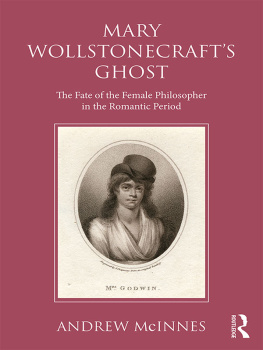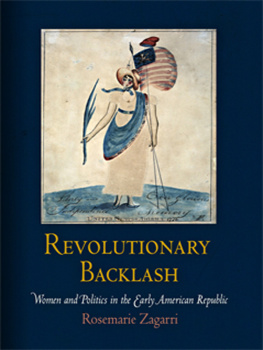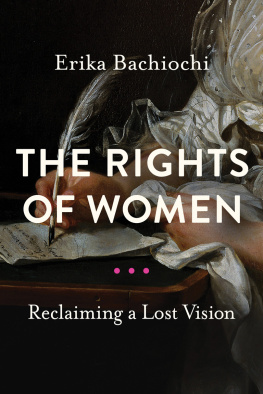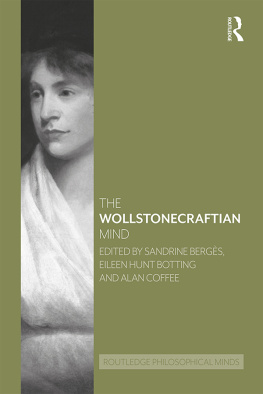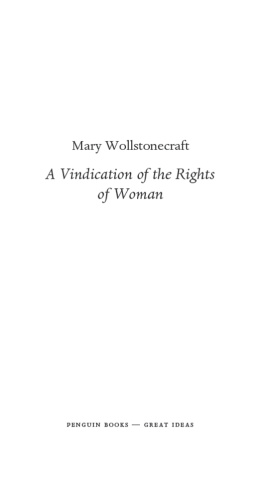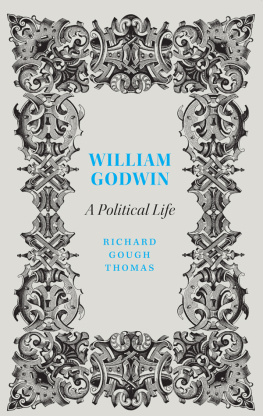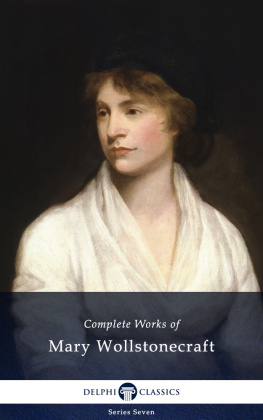Wollstonecrafts Ghost
Focusing on the ways in which women writers from across the political spectrum engage with and adapt Wollstonecrafts political philosophy in order to advocate feminist reform, Andrew McInnes explores the aftermath of Wollstonecrafts death, the controversial publication of William Godwins memoir of his wife, and Wollstonecrafts reception in the early nineteenth century. McInnes positions Wollstonecraft within the context of the eighteenth-century female philosopher figure as a literary archetype used in plays, poetry, polemic and especially novels to represent the thinking woman and address anxieties about political, religious and sexual heterodoxy. He provides detailed analyses of the ways in which women writers such as Mary Hays, Elizabeth Hamilton, Amelia Opie, and Maria Edgeworth negotiate Wollstonecrafts reputation as personal, political, and sexual pariah to reformulate her radical politics for a post-revolutionary Britain in urgent need of reform. Frances Burneys The Wanderer and Jane Austens Mansfield Park, McInnes suggests, work as state-of-the-nation novels, drawing on Wollstonecrafts ideas to explore a changing England. McInnes concludes with an examination of Mary Shelleys engagement with her mother throughout her career as a novelist, arguing that Shelley gradually overcomes her anxiety over her mothers stature to address Wollstonecrafts ideas with increasing confidence.
Andrew McInnes is Senior Lecturer in English Literature at Edge Hill University, UK.
First published 2017
by Routledge
2 Park Square, Milton Park, Abingdon, Oxon OX14 4RN
and by Routledge
711 Third Avenue, New York, NY 10017
Routledge is an imprint of the Taylor & Francis Group, an informa business
2017 Andrew McInnes
The right of Andrew McInnes to be identified as author of this work has been asserted by him in accordance with sections 77 and 78 of the Copyright, Designs and Patents Act 1988.
All rights reserved. No part of this book may be reprinted or reproduced or utilised in any form or by any electronic, mechanical, or other means, now known or hereafter invented, including photocopying and recording, or in any information storage or retrieval system, without permission in writing from the publishers.
Trademark notice: Product or corporate names may be trademarks or registered trademarks, and are used only for identification and explanation without intent to infringe.
British Library Cataloguing in Publication Data
A catalogue record for this book is available from the British Library
Library of Congress Cataloging in Publication Data
Names: McInnes, Andrew, author.
Title: Wollstonecrafts ghost : the fate of the female philosopher in the Romantic period / by Andrew McInnes.
Description: New York : Routledge, 2017. | Includes bibliographical references and index.
Identifiers: LCCN 2016010020 | ISBN 9781138696334 (alk. paper)
Subjects: LCSH: English literature--19th century--History and criticism. | English literature--18th century--History and criticism. | Women in literature. | Women philosophers. | English literature--Women authors--History and criticism. | Philosophy in literature. | Romanticism--England. | Wollstonecraft, Mary, 1759-1797--Influence.
Classification: LCC PR468.W6 M35 2017 | DDC 820.9/928709034--dc23
LC record available at https://lccn.loc.gov/2016010020
ISBN: 978-1-138-69633-4 (hbk)
ISBN: 978-1-315-52317-0 (ebk)
For Abbi, because shes foolproof
The image of Mary Wollstonecraft on the front cover of this monograph is a posthumous, counter-revolutionary caricature of the (in)famous writer and thinker. I am haunted by this womans provocative stare as much as I am entertained by the jaunty angle of her top hat I feel that the grainy, black and white image perfectly encapsulates the idea of Wollstonecrafts ghost: the figure challenges the viewer as Wollstonecraft continued and continues to exhort readers and writers to live up to her life and writing. Thanks to the National Portrait Gallery, London, for permission to use the image.
I would also like to thank Taylor and Francis for permission to reproduce a small section from my article Feminism in the Footnotes: Wollstonecrafts Ghost in Mary Hayss Female BiographyLife Writing 8.3 (2011), 27381 (see .
Over the course of writing this book, I have accrued many debts which I fear I will be unable to repay. However, I would like to thank Jane Spencer and Adeline Johns-Putra for their unflagging intellectual support for the project. Their constructive and incisive feedback has improved this work in more ways than I can say. They remain my models of how to be an academic: intellectually exacting, caring towards students, and passionate about their work.
Thanks to the English staff at the University of Exeters Tremough campus, particularly Jason Hall, for pointing me in the right direction, and Nick Groom, for mentoring me throughout my time there, but also to: Jess Allsop, Jo Esra, Victoria Gibbons, Marion Gibson, Kyriaki Hadjiafxendi, Kate Hext, Jim Kelly, Ayesha Mukherjee, Alex Murray, Joanne Parker, Chloe Preedy, Rob Smith and Christopher Stokes; all excellent teachers, colleagues, and friends. Thanks also to my former fellow students in the now defunct postgrad corridor, for coffee and comradeship: Ben Carver, Jane Costin, Niamh Downing, Amal el-Mohtar, Vanessa Hager and, most of all, Rebecca Mills, without whom this book would look very different and be impoverished for it. Further thanks to others at Tremough, both from Exeter and the University of Falmouth: Douglas Bell, Ruth Heholt, Christina Lake, Kym Martindale, Richard Noakes, Catriona Pennell, Faiz Sheikh and, especially, to Chrisy Dennis, conference pal par extraordinaire. I would also like to thank colleagues from up country, mostly for patient and exemplary editing: Amy Culley and Rebecca Styler, Maria Purves, Kate Scarth and Fran Scott. And to Isabelle Cosgrave, for Wollstonecraft Day, the Romanticism Reading Group, and irregular gossip and giggles. I would also like to thank my new place of work, Edge Hill University, for giving me time to finish this project, especially to Mike Bradshaw, Steve Van Hagen, Rob Spence and Jenny Barrett.
Research-led teaching and, less commonly, teaching-led research are buzzwords, but the students at Tremough, especially those in the eighteenth-century module Reason and Passion but also in all those workshops, have directly and indirectly inspired my work, from the very early stages of this project through to nearly the very end thank you! On the subject of teachers, Id like to thank my old English teacher, Dr Engelberg (um, Karsten), for suggesting I read Wollstonecrafts Letters from Sweden, and for much else besides.
I would like to thank Ann Donahue at Ashgate for her patient and enthusiastic support for this monograph from the beginning, as well as the two anonymous readers whose careful criticism helped shape and refine the project. Ashgate titles were a source of inspiration for me throughout this project an independent publisher with a flair for the unusual and a commitment to scholarship. Thanks also to Liz Levine and Nicole Eno at Routledge for smoothing an awkward transition, and Ashley Thorpe and Kris Wischenkamper for their work during the Production process.
Finally, Id like to finish by thanking my family for their incredible support over the course of the last few years: mum and dad, without whom this whole enterprise would not have been possible; Auntie Sheila, for hospitality and several fact-checking missions; Lynsey and Nils, for academic solidarity; Jackie and John, for looking after us; and, above all, to Abbi, with love, for everything.

